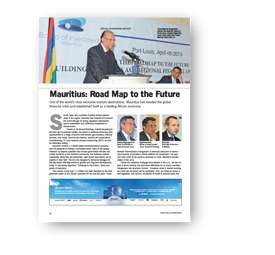The company is proud to be the authorized distributor and official
importer of approved dealers of leading brands in both Mauritius and
the region, bringing some of the world’s most prestigious names to
customers, including Aston Martin, Asus, Berloni, Ferrari, Miele, Nokia,
Puma and Stressless, among others.
As Rawat says: “We have always tried to meet the changing
demands of the market over the years, but we cherish that we have always
been in advance of the game. Pure economics require that there
is an adequate supply for the demand. But at the same time, we have
the vision to create the demand by putting at the disposal of consumers
the ability to safely buy high-quality goods and commodities that
were unavailable. We are now a major player in modern Mauritius: we
allow people to keep in touch using Nokia phones and by providing
businesses with the Asus IT equipment to operate the smart way.”
Improving Air Travel
During the roundtable event, Air Mauritius CEO Andre Viljoen, outlined
his views on the country’s potential as a regional business hub with a
rousing speech that demonstrated the company’s astute business acumen
and dramatic turnaround over the past two years:
“This statement made by the esteemed Judge Cecil Margo—’A
mile of road leads to nowhere, but a mile of runway leads to everywhere’—emphasizes the strategic importance of aviation. This is even
more true for an island like Mauritius. Aviation is the most rapid means
of transport connecting our island state to people, societies, cultures,
businesses and markets around the world. To better explain the role Air
Mauritius will play in the future, it is important to relate it to our sevenstep
recovery program.
“In January 2012, Air Mauritius, like many airlines, found itself at
a crossroads and had to make some fundamental choices as a result
of an operating environment that had radically deteriorated. Fuel prices
had spiraled and remained persistently high, while the euro/U.S. exchange
rate had weakened by more than 15% and travel demand from
Europe remained under pressure. To explain the magnitude of the fuel
challenge for us: Because we are predominantly a long-haul operator
(our main market, Europe, is 9,000 kilometers away), fuel soared to
40% of our total costs, comparable with the national health budget.
These factors resulted in our reporting a net loss of €30 million for the
last financial year.
“Realizing that a do-nothing strategy was not an option, we
realigned our network to better address the realities of the market and
concentrated on new and existing gateways, including Paris, London,
Mumbai and Delhi, Kuala Lumpur, Shanghai, Hong Kong and Beijing,
Perth, Dubai, Johannesburg, Cape Town, Durban, Nairobi, Antananarivo,
Réunion and Rodrigues. During the last year, we have increased
the number of seats by more than 32,000, despite having suspended
single-frequency flights to Frankfurt, Geneva and Milan.
“For the financial year 2012-2013, we increased seat capacity by
69,000 seats, thanks to a 44% increase on East Asia, a 48% increase
on Australia, a 5% increase on Madagascar and a 10% increase on
Nairobi. The 8% slump in tourism arrivals from Europe in 2012 was
compensated by the new network, and with new flights to China, Air
Mauritius is expected to record double- or even triple-digit growth
figures this year. We provide 2,800 Mauritians with jobs and produce
around 19 billion rupees in goods and services, most of which are from
local suppliers,” Viljoen says. “Of the 2.5 million passengers that travel
to and from Mauritius each year, 1.3 million—that is slightly more
than half—choose to travel with us. Air Mauritius has shown resilience
to some of the most hostile years the airline industry has known.
Almost 50 airlines have collapsed, but we are still here, still standing and serving the nation. We have managed to get back on the path
toward recovery and sustained profitability without any bailout.”

